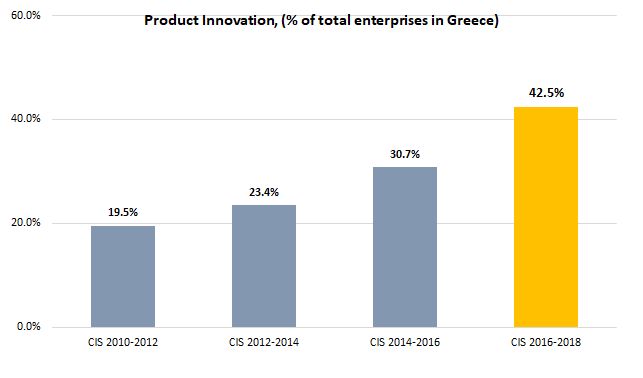
Greece is in 9th place in the European ranking in terms of innovative enterprises for the three-year period 2016-2018. The percentage of Greek enterprises that innovate amounted to 60.3, showing an increase of 2.6 percentage points compared to the period 2014-2016, according to the data of the European statistical survey CIS (Community Innovation Survey) on business innovation.
The survey for Greece was carried out by the National Documentation Centre (EKT), as the competent National Authority of the Hellenic Statistical System for European statistics on innovation, in collaboration with the Hellenic Statistical Authority (ELSTAT).The survey included 12,213 Greek enterprises with 10 persons employed and more, in various sectors of economic activity.
According to the results announced by Eurostat, the first country in the European ranking is Estonia with a percentage of 73.1 innovative enterprises, followed by Cyprus with 68.2%, Belgium and Germany with 67.8%, Italy with a percentage of 63.2 and Greece with a percentage of 60.3. It should be noted that the percentage of innovative enterprises in Greece is higher by 10 percentage points compared to the average of the 27 European countries (50.3%).

In contrast, the innovative enterprise figures for Romania (14.6%), Poland (23.7%), Hungary (28.7%) and Bulgaria (30.1%) are all below 30%. Overall, half of the enterprises (50.3%) in the European Union with at least 10 employees declared some innovative activity during the three years 2016-2018, a slightly higher percentage than the three years 2014-2016 (49.5%).
According to the results of the survey in Greece for the period 2016-2018, 60.3% of enterprises innovate, either in their products or in their business processes. This percentage of innovative enterprises has been on the rise in recent years. In the period 2016-2018 it increased by 2.6 percentage points compared to the immediately preceding period 2014-2016 and by 8 percentage points compared to the first reference period 2010-2012.
The CIS study for the three years 2016-2018 was carried out based on the methodological guidelines of the new revised Oslo Manual 2018 'Guidelines for collecting, reporting and using data on Innovation', in a joint edition of Eurostat and the OECD. The new Oslo handbook has introduced significant modifications in the conceptual framework and measurement of innovation, and applied to CIS survey from 2016-2018 onwards.
The new edition of the Oslo manual has undergone significant changes in the definitions of innovation types. There are now two types of innovation: innovations that change the enterprise's products (product innovations) and innovations that change the business processes of the enterprise (innovations of business processes). The products include the goods and services of the enterprise, or a combination thereof. Business processes include all the main activities of the enterprise related to the production of products and all other supporting activities such as logistics, financial management, IT applications, work organisation and marketing.

In product innovation, Greece ranks 4th among European countries, with 42.5%, a percentage well above the European average (29.8%). In fact, Greece showed an increase of 11.8 percentage points compared to the period 2014-2016 (30.7%) and more than double the growth rate compared to the period 2010-2012 (19.5%). The leading European country in product innovation is Estonia with 49.5%, followed by Cyprus with 48.6% and Sweden with 42.6%
In business process innovation, Greece again occupies 4th place, with 55.2%, a percentage higher by 15 percentage points compared to the European average (40.2%). The leading European country in process innovation is Cyprus with 65.9%, followed by Belgium with 58.1% and Germany with 55.4%.
The publication 'Key Indicators for Innovation in Greek Enterprises 2016-2018' is available (in Greek) at https://metrics.ekt.gr/publications/449.The full set of indicators will soon be available in EKT's detailed special report.
The statistics and indicators for Research, Development and Innovation in Greece, which are produced and published by EKT, are sent on a regular basis to Eurostat and the OECD. Analysis of the data and the relevant indicators are published by EKT in printed form and electronic versions available at http://metrics.ekt.gr/en.
The CIS survey for the three years 2016-2018 was funded by Sub-Project 5 'Production of RIS3 indicators for the years 2016-2023' implemented by the National Documentation Centre and is part of the 'Monitoring Mechanism' of the RIS3 national strategy-'Collection and processing of Indicators'.The Operation is co-financed by Greece and the European Union (European Regional Development Fund) through the Operational Programme 'Competitiveness, Entrepreneurship, Innovation 2014-2020'.
Community Innovation Survey (CIS)
The Community Innovation Survey (CIS) is the official European statistical survey on innovation. It is conducted every two years in all EU member states through a harmonised model questionnaire, in accordance with European legislation, the methodological guidelines of the Oslo Manual (OECD / Eurostat 2018) and the Eurostat guidelines, ensuring high quality and comparability of indicators. Data is collected on product innovations (goods or services), business process innovations, the introduction of new products into the business and market, strategies, knowledge flows and business co-operations, public funding that supports their innovation activities and the obstacles that businesses face in developing innovation.













